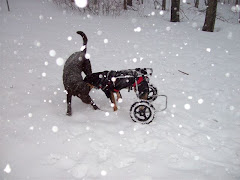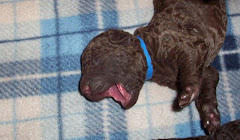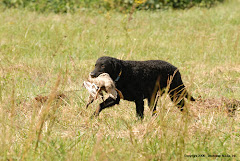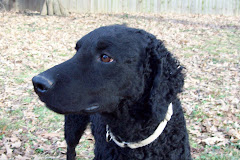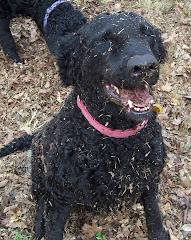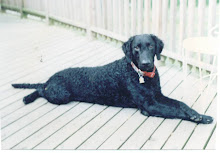The first time ever I saw her climb . . . (ok, I went lyrical because her name is Singer).
We had traveled to Flora, Mississippi (near Jackson) to run an AKC hunt test conducted by the Magnolia Hunting Retriever Club. Singer, my Curly-coated Retriever, was 9 1/2 months old and needed to pass the test to earn her AKC Junior Hunter (JH) title.
For those who don't know, at the Junior level, two judges and the dog and handler stand at the line, a bird goes down and the dog is sent to pick it up immediately. The dog must pick up two individual retrieves on land and two on water and they are graded in several areas in order to pass the test. They must pass four tests to earn the JH title.
No water test is ever "easy" when you are the one standing at the line, but this one was stacked against the Babe. First, as she swam through the "flock" of decoys, she got tangled in one decoy's line and dragged it across the pond, continuing towards her bird as though the decoy wasn't even there. She shook the decoy at the bank, picked up her bird and retraced her path, strait back to me through the water.
Then, on the second mark, the bird was supposed to be thrown in the water just behind a fallen tree that was designed to be an obstacle in the direct line between the dog and the fall. The bird was thrown, and Singer began her swim towards the fall, and by necessity, the tree.
When she reached the tree, however, instead of swimming around it as the other dogs had done, she swam directly into it (there was no easy path through it). Then, she started trying to climb it . . . she would hook her front legs over a limb, move them up to a higher limb, pull her back legs onto the first limb . . . and sink back into the water, as the lower limbs had no resistance in the water to help hold her weight. This was repeated several times, but she wouldn't give up. She kept trying to get high enough to break free of the water.
Back on the line, the judges and I kept trying to figure out what she was doing. We thought she'd gone nutz! And I was trying to decide whether it was time to call her in (knowing she wouldn't come back without a bird). I didn't want to go swimming to get her and the judges never said "pick up your dog" so I waited. And she just kept trying to climb that tree.
After what seemed like an eternity (time stands still on the line), but more like one or two minutes, she broke water and literally climbed about four feet into the tree. She came down with her duck! Unbeknownst to anyone, the bird had accidently been thrown into the crown of the fallen tree - we had all watched it go down but assumed it had fallen into the water behind the tree. My little girl watched it go down too, and she followed the mark and her nose . . . into the tree, and she didn't give up until she got her bird.
Afterwards, I accused the judges of trying to sabotage her tests because she was curly. They laughed, but they were amazed by her performance.
Over time, Singer has climed into a few more bushes and trees looking for things real or imagined. And I smile every time I pass those bright orange ribbons that remind me of the tense moments as I watched the nutty little Curly try to climb a tree.
Q & A for the day:
How can I get my retriever involved in training and running a hunt test?
I'll say this first - you are looking at spending hours training, gas traveling and cash for the accessories. You may make friends with folks who do the same thing. And, if you get hooked, you'll be doing it a lot more. You might even find yourself trading in your car for a vehicle that can carry your dog and your "stuff" - I moved up after a few years. I managed quite well using two folding General crates and a sun shield, operating from the trunk of my Thunderbird (and there weren't that many places that I couldn't get to in the car).
Hunters use training for hunt tests to keep their dogs conditioned during the off season. Others participate for the pleasure of the sport. So there are usually people out training in many areas for a number of reasons.
Sometimes, you can see folks out training and you can walk up, introduce yourself and express your interest in getting started. (In the summer, look for them at dawn when the day is still cool - they're usually done by mid-morning.) They may or may not be helpful, but you can usually get the name of someone to contact who will be helpful. Don't confuse 'hot and tired' with indifference, although you may see either, but you can still get that name.
You can also ask your other dog associates - e.g. someone at the obedience, agility or conformation club will know who trains their retrievers. Or, you might check at the sporting goods store that carries dog training equipment. You may find them at work or at church, you just have to ask (or check the parking lot for vehicles with dog crates and DU decals). You get the picture.
In today's information age, clubs are pretty easy to find. When you contact a local club, you can usually find out who is training in your area. Many clubs actively mentor newcomers and will put you in touch with someone who can help you get started.
The Amercan Kennel Club lists their test-giving clubs on their website at http://www.akc.org/clubs/search/index.cfm?action=perf&display=on,
just select "hunting tests" and your state. A contact for each club is listed. If you have to write, send your email address and a phone number to make it easier for them to contact you.
The United Kennel Club (UKC) lists their clubs as well at http://www.ukcdogs.com/Clubs.nsf/ClubViewHRC?Open&Start=1&Count=30&Type=HRC&List=A
In my opinion, the UKC tests are the most fun and realistic (patterned after actual hunting scenarios and emphasizing gun safety) to run.
The North American Hunting Retriever Association lists member clubs at http://www.nahranews.com/html/nahra/clublist.htm These folks are not everywhere but I've heard good things about their tests.
There are also pro-trainers out there (both good and bad - interview them like you would a nanny for your child) but I don't recommend going that route, at least until you determine that you like the sport enough to become involved in it. All of my dogs have been owner trained and handled. I love the sport and have nothing to prove that would require the use of a pro trainer.
Hunter
A true gentleman
Sunday, May 18, 2008
Thursday, May 8, 2008
A soft mouth
Deacon, my Curly-Coated Retriever, has a very soft mouth. Since he was not actively field training, I might have missed this fact except for an incident that happened one spring morning.
Every morning the dogs run outside in a fenced back yard then come in and hang out with me for awhile before I have to go to work. One morning, after the dogs had been back inside for about half an hour I noticed that unmistakable look on Deacon's face and knew that he was hiding something in his mouth. You know the look, the cheeks kind of puff out and it's the only time that he isn't under foot.
Fearing the worst, I stuck out my hand and said "Give!". He hesitated for a few moments then moved to give me his prize. Very gently, he placed an object in my hand. . . a bird. . . a baby bird . . . a tiny, featherless baby bird. . . that was now opening and closing its mouth waiting for "mama" to provide the next meal. The baby bird had been comfortably hiding in his mouth for half an hour.
I didn't have the heart to tell Mama Deacon that his baby would not survive. . . it was too young to survive without a real mother bird. We went out and looked for a nest but there was none to be found. We left the baby where its mother could find it if she was looking for it and went back inside.
Also see: Soft Mouth; Can You Train It posted on this blog on 01/17/2010.
Q & A for the Day:
So, what is a soft mouth in retriever lingo?
The dog must have a firm grip to hold a bird, from a small dove to a large goose. The soft mouth is best evidenced by what the dog delivers to you. . . a bird without teeth marks or crush injuries (from the dog's jaw). A soft mouth is evidenced by a firm hold with no chewing or chomping. The bird has usually been shot so there will be blood, but the retriever should not be enticed by the blood to determine that the bird should become his own dinner (yes, it happens). There is some confusion with this point, though, because a soft mouthed dog can also decide to eat the bird, but that is usually a training issue.
A well trained retriever is a great conservation tool. Hunters who take their daily limit without a good retriever (human or canine :-) have probably left several dead birds at the hunt site because they couldn't reach or find them. A good hunting dog will retrieve every bird that falls so there are no unnecessary kills required to meet the limit.
For those hunters that "kill" more than the legal limit so they can leave with a limit. . . shame on them. Every bird down counts. If they want to take them all home, they should get a good 'huntin dawg'.
Every morning the dogs run outside in a fenced back yard then come in and hang out with me for awhile before I have to go to work. One morning, after the dogs had been back inside for about half an hour I noticed that unmistakable look on Deacon's face and knew that he was hiding something in his mouth. You know the look, the cheeks kind of puff out and it's the only time that he isn't under foot.
Fearing the worst, I stuck out my hand and said "Give!". He hesitated for a few moments then moved to give me his prize. Very gently, he placed an object in my hand. . . a bird. . . a baby bird . . . a tiny, featherless baby bird. . . that was now opening and closing its mouth waiting for "mama" to provide the next meal. The baby bird had been comfortably hiding in his mouth for half an hour.
I didn't have the heart to tell Mama Deacon that his baby would not survive. . . it was too young to survive without a real mother bird. We went out and looked for a nest but there was none to be found. We left the baby where its mother could find it if she was looking for it and went back inside.
Also see: Soft Mouth; Can You Train It posted on this blog on 01/17/2010.
Q & A for the Day:
So, what is a soft mouth in retriever lingo?
The dog must have a firm grip to hold a bird, from a small dove to a large goose. The soft mouth is best evidenced by what the dog delivers to you. . . a bird without teeth marks or crush injuries (from the dog's jaw). A soft mouth is evidenced by a firm hold with no chewing or chomping. The bird has usually been shot so there will be blood, but the retriever should not be enticed by the blood to determine that the bird should become his own dinner (yes, it happens). There is some confusion with this point, though, because a soft mouthed dog can also decide to eat the bird, but that is usually a training issue.
A well trained retriever is a great conservation tool. Hunters who take their daily limit without a good retriever (human or canine :-) have probably left several dead birds at the hunt site because they couldn't reach or find them. A good hunting dog will retrieve every bird that falls so there are no unnecessary kills required to meet the limit.
For those hunters that "kill" more than the legal limit so they can leave with a limit. . . shame on them. Every bird down counts. If they want to take them all home, they should get a good 'huntin dawg'.
Subscribe to:
Posts (Atom)
